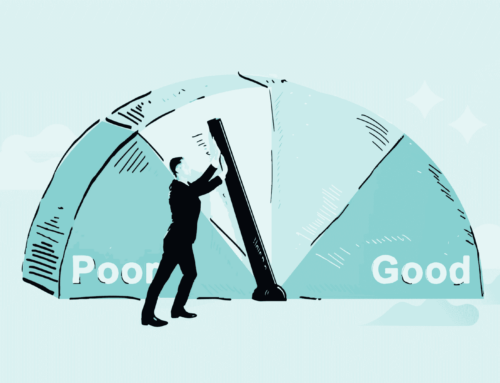We recently discussed the benefits of good credit for loan approval and how to monitor your credit score in Canada. Having a good credit score will make obtaining financial products easier and provide you with many great financing options for your future.
When it comes to your credit score, your credit card plays a huge role in helping you boost your score. And for many, there are ways we can boost our credit score with our credit card that we’ve never even heard of. We all know that having bad debt = a bad credit score, or that if you have multiple maxed-out credit cards the results are pretty much the same.
On the other hand, we often associate credit cards with worry and stress. But if we use our credit cards wisely, we can learn exactly what to do to build a good credit score. Let’s learn how.
What is credit utilization?
Credit utilization is a word we hear quite often when it comes to our credit score and reports, but one we’re often confused by. Credit scoring models often use credit card utilization rates to calculate your credit score. The credit utilization ratio is how much you currently owe divided by your total credit limit. It’s the amount of revolving credit you’re currently using divided by the total amount of revolving credit you have.
It’s generally expressed as a percentage. For example, if you have a total of $5,000 of total credit available on two credit card accounts, and a balance of $2,500 on one, your credit utilization rate is 50% — you’re using half of the total credit you have available. It’s recommended to have a credit utilization ratio of less than 30%. Having a credit card utilization ratio of this amount shows to your credit card issuers that you are not over-utilizing your credit card, and not at risk of missing payments. It shows you are good at managing your debt payments.
1. Keep your credit card accounts open
We often hear rumours that closing your credit card account will make for a better credit score. That’s not necessarily true. Of course – if you have no credit card, it may benefit you if you’re an over-spender or someone who may not be great at budgeting (removing the temptation and avoiding debt). But closing your credit card means you lose that cards credit limit when your overall credit utilization is calculated, which can lead to a lower score.
So sometimes, it’s better to keep your credit card and not use it, or even make very small payments on your card.
2. Ask for higher credit limits
Smart usage is key to improving your credit score using your credit card. It’s important when asking for a higher limit, you do not use your extra available credit. When you ask for a credit limit increase, but your balance stays the same, it lowers your overall credit utilization ratio.
Basically, this means you have a high credit limit but aren’t near to maxing out your card. You can contact your credit card provider to request this but be sure to make sure it isn’t a hard pull inquiry. A hard pull inquiry can temporarily damage your credit score.
3. Make payments more than once or twice a month
If you make frequent payments towards your credit card debt (called micropayments), this can help you keep your credit card balance down. This helps to keep your credit utilization low. If you’re able to keep your utilization low instead of letting it build toward a payment due date, it should benefit your score right away.
4. Clear your balance in full (when possible)!
This may be an obvious one, but when you pay your balance off in full (and if you’re able), you’re on track to building a good credit score. Your credit score is basically a reflection of how well you pay back the debt. We all know that late payments make for a bad credit score and it’s vital to have a record of on-time debt payments. But what happens If you’ve never had to make such payments, you don’t have good credit. You have no credit.
This helps you avoid paying interest and avoid any penalties for late payments.
5. Check your credit report for errors
Most Canadians don’t realize that once a year, they have free access to their credit report. This means you can spot-check it. It’s important to check for errors as there may be something major weighing down your score and causing you financial trouble. You may have payments that are marked as late or negative information on your report that’s too old to be listed.
You can report a dispute to TransUnion or Equifax. They will usually evaluate your dispute and respond within 30 days.
6. Pay your utility bills on time
It’s vital to stay on top of your utility bills. Whether it’s your mortgage, loans, car payments, subscription services, gas or electricity. Any bill that you have that comes out of your credit account must be watched like a hawk. Payment history has the single biggest effect on credit scores, and late payments can stay on your credit reports for seven years.
7. Check your credit score regularly
It’s important to not only try to build good credit using your credit card but use this opportunity to monitor it along the way. How are you supposed to know if your credit score is improving or declining without checking your score? There are many ways you can obtain a free credit score online and it’s important to remember that building good credit takes time. But If you’re searching for a way to build credit fast and monitor your credit score, check out how you can with MyMarble Premium’s Score-Up here.
8. Use a secured credit card card
A secured credit card is a type of credit card backed by a cash deposit from the cardholder. This deposit acts as collateral or security on the account, which is provided to the credit card company. Most Secured credit cards do not require a credit check from the card issuers and will help you build good credit fast. By making positive payments back to your credit card company, you will be able to build credit fast.
About Marble Financial Inc. (CSE: MRBL; OTCQB: MRBLF). We are a group of forward-thinking financial technology experts that fully understand the benefits and drawbacks of credit in Canada. Marble helps Canadians boost their confidence to gain access to prime lending. Through our industry-leading proprietary technology solutions: Fast- Track, Score-Up, and Credit-Meds. Since 2016, Marble is proud to have empowered thousands of Canadians to a positive financial future. We continue to establish ourselves as leaders in financial wellness.






